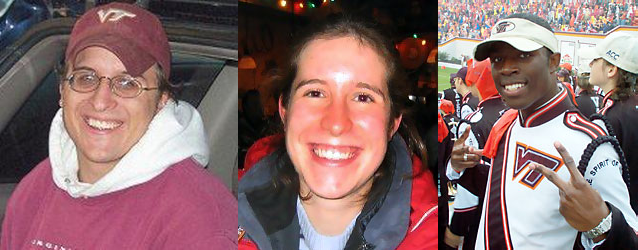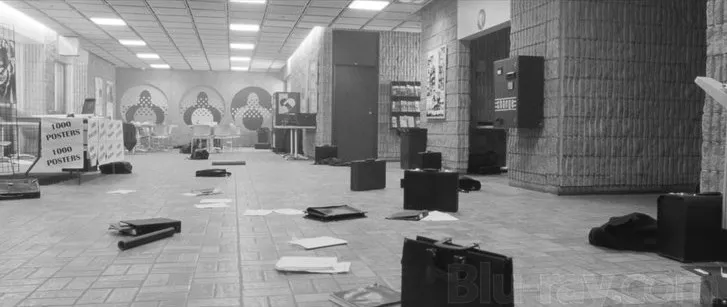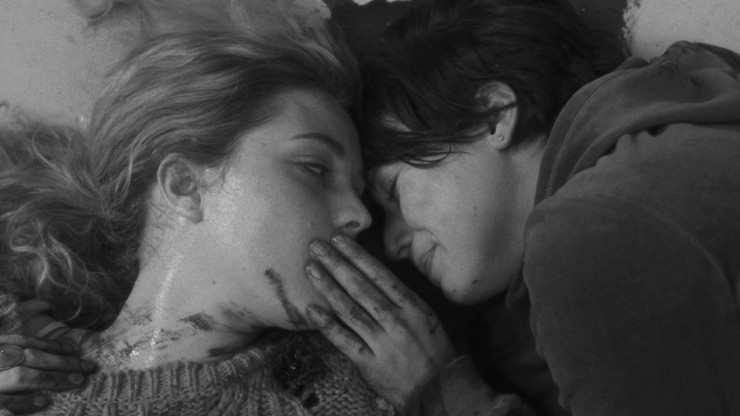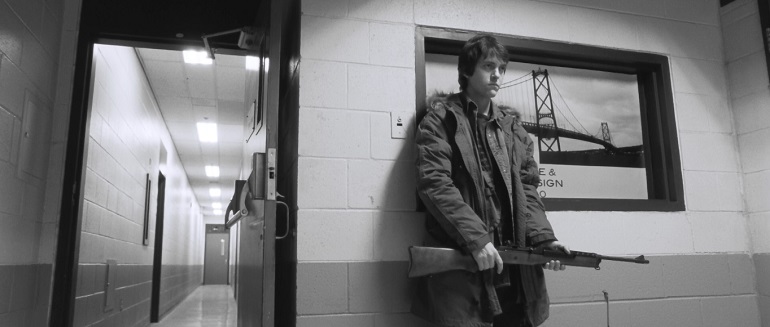Misfire
A few nights ago, I drafted (then deleted) a review of Polytechnique that concluded my thoughts with: “Oh yeah, and I am the survivor of a school shooting with a lot of similarities to this one, and I’m not really sure if that changed how I felt about it.” But I decided that probably deserved a little bit more upfront consideration, since, after a little more reflection, I disagree with my initial statement: I think my personal history with school shootings impacts how I feel about this film quite a bit.
I was an engineering student at Virginia Tech in 2007 when 32 students were killed in a shooting spree. I was a few hundred yards from both shooting incidents that April morning. At the time of the major shooting incident, I was skipping a class that was held one building over from Norris Hall, about a hundred feet from the chained doors. Two days earlier, I had been in the the dorm where the first shooting took place, as my good friend at the time lived there. Luckily, I was never really in harm’s way, so maybe “survivor” is not the correct term; I’ve never quite known the best term to label myself, but that’s a term people understand.

Three people I knew quite well were killed — my engineering lab instructor, Brian Bluhm; a friend who lived three rooms down from me in my dorm, Leslie Sherman; and a leader in the marching band with me, Ryan “Stack” Clark. It was indescribably surreal and sad when they died, basically incomprehensible to my 18-year-old brain. It was probably the closest brush with death I encountered until my father passed away just last year, 16 years later.
I ended up transferring to another college to finish my degree, though I had already applied to transfer before the shooting. The shooting and its aftermath weren’t direct reasons for my decision to accept the transfer offer a couple months later, though they were almost certainly an indirect ones. I had a lot of complicated feelings about my identity and trajectory at Virginia Tech that made me want a fresh start for my sophomore year.

Back to Polytechnique, Denis Villeneuve’s third film. It tells the story of a real-life mass shooting in 1989 at Polytechnique Montréal, a Canadian university. Over the course of about twenty minutes, fourteen people were murdered, all women. The film closely follows the killer and three of his victims on the day of the shooting in a realistic, docudrama style. The film highlights the killer’s anti-feminist rhetoric and actions.
I do not like Polytechnique, but I don’t think it is an outright bad film. It is pretty gripping to watch. It’s well-made on a technical level. Villeneuve and cinematographer Pierre Gill in particular make great use out of black and white: It lends the story an air of drama and sadness, and it serves a bunch of specific visual purposes, like transforming blood into a black visual void of darkness. Figures become more anonymous and muted in black and white, the killer’s face more ghost-like.

There are some interesting motifs in the script, too, which give just a little bit of shape and thematic purpose to the film: The parallel dictated letters at the beginning and the end of the film, showing two broken worldviews, one from totally imagined and false slights and revealing its writer’s violence, one from real trauma and revealing its writer’s empathy. Bizarre and compelling juxtapositions in the chaos and violence emerge, like when two survivors inadvertently traumatize the other — one thinking the other the killer and playing dead, the other thinking the first dead and breaking into uncontrollable grief.
Since my own baggage and moral reasoning with the material (which I will expound upon later in this review) may or may not match your own, I should point out that there are some material problems separate from my hand-wringing. The biggest one is the narrative structure. The shooting is an incident, not a story: Fitting it into feature length requires padding and additional contextualizing material to unnaturally stretch out a scenario. (This is the same issue I had with Sully, too.) Polytechnique uses an especially choppy nonlinear timeline that Villeneuve seems to have designed with a specific final image in mind (and it’s a good one), but a haphazard approach to getting there. The flashbacks and flash-forwards are tossed about rather incoherently.
The movie strikes two angles at once with regard to the killer. First, it shows his motivations as anti-feminist terrorism. Second, it shows his mental state as totally disconnected from the world. Acknowledging both of these as truths presents a problem, because it at once gives us a theme to galvanize around — feminism in traditionally male spaces is good — and simultaneously strips that theme away by suggesting none of the killer’s actions had any real meaning. I tend to think that the latter is the most valid reading, but even if you accept both, they kind of cancel each other out.

Villeneuve took nine years after Maelstrom to make this. He has said he used this time to work through various scripts, improving his craft at telling real human stories. This seems to me as a bit of backhanded criticism towards his first two films, both of which I like more than this. Those two are filled with just enough whimsy and adventurous images to suggest a world worth exploring and pondering more deeply. Polytechnique is a surface-level exercise of grief and outrage, though it does display a bit more humanism than his earlier works. But it’s to no better cinematic effect — his efforts to translate a real life event into a story that matches his own storytelling approach doesn’t really click.
But in spite of all of that, the movie just made me feel numb and exhausted. All I can think is why? Why tell this real life story in this way?
Long story short: The movie is transfixing, but it only offers morbid gawking and shallow reckoning. Be warned that the rest of this review is basically me purging many years of frustration and cynicism as I dig deeper into my thoughts on the matter. You can probably stop reading here and proceed with your day if you just navigated here for a take on a movie.
There are some good answers to the question of “why?” Art is not inherently bad because it finds no solution to complex problems it tackles. Sometimes it just tells a story or helps us remember; and given that this shooting occurred in a place and time that does and did not see many mass shootings, I get the impulse. There is value in unpacking real life tragedies even to just give ourselves space to think about them. I’m sure Polytechnique has provided some worth to some people in that regard. It is in our nature as humans to look at disorder — pointless acts like a mass shooting — and try to prescribe order and meaning, to try and process them in the way our human instincts and conditioning tell us to.
But sometimes senseless violence really is senseless. No insight can be gleaned except things we already know, like: shooting people is bad and feminism is good. We all know that, though, right? So, I wonder, why make this movie except morbid fascination? To be fair, expolitative sensationalism is a reason to make a movie (rarely a good one, but one with a lot of precedent), but that sort of indulgent violence-titillation not really the mission statement of Polytechnique. It intends to be informative, perhaps even palliative, and that is where it fails. Though we may feel the compulsion, staring and dwelling upon an act like this is neither therapeutic nor enlightening. It just makes you sad to no other ends.

As I worked through these thoughts for the thousandth time, it also occurred to me that not everyone might have already drawn these conclusions, as not everyone has spent so much of their life force as I have thinking about mass shootings. Certainly many Americans have. We have been drowned with school shooting headlines and thinkpieces and talking head analysis in the fifteen years since Polytechnique was released. Hell, a sizable portion of us have crossed paths with mass violence directly. So the idea that this film and the event it is memorializing offers some specific, unique sordid tale is simply not true, sad though that fact is. It’s just one more data point in a disturbingly normal pattern.
I, personally, have been drowned in the material for seventeen years now. Brushing so closely to violence like this, I’ve both consciously and subconsciously asked the questions this movie and those like it ask: What makes someone snap and resort to this? How did it unfold, and how did people feel as it did? What can be understood in those actions? How could it have gone differently if someone had taken some preventative action? For years and years I’ve pondered these questions, and I always end up deciding they don’t really have answers, or at least useful ones. Dwelling on it, minute by minute, killing by killing, one piece of evidence at a time, leaves me with a total vacuum of insight except that this killer was a deeply and fatally broken person, and I am sad about the violence that fact wrought.
To psychologically explore and relive these events is to douse yourself in nihilism to no gain. I have processed that. I’ve moved on as a happy person. I honestly don’t even think about that April day and its impact on me and my community all that much anymore unless something specific prompts it. I’ve come to terms with the fact that I was once near a mass shooting, I was physically unharmed, and I lost some friends as part of it. I don’t think I or anyone can get much value dwelling on it at this point. The loving memories with friends and the lingering sadness of a tragic loss, sure — those are important and offer value. But those aren’t the shooting itself, and those aren’t really what Polytechnique is about: This is a film about a real killer and the killing he did, and I have to be honest that I just don’t see much point in a movie like that.
At the end of the film, survivor Valerie (Karine Vanasse) suggests that she will teach her unborn child to be brave and to love, a counterpoint to the killer; as if this mass murder was a simple failure of empathy. I understand Villeneuve’s thought here, and the well-meaning optimism of plenty of people looking for some way to reduce these tragedies through putative individual acts of kindness and positivity. If violence is anti-love, then the opposite must be true: surely, love is a force that can curb violence.

But this honestly torpedoed whatever benefit of the doubt I was willing to lend Polytechnique. It inadvertently legitimizes killer’s act by suggesting it can be understood in logical terms and could have been corrected. Even the act of vilification empowers the figure of the shooter, who becomes in that moment the arbiter of life and death, the one who can snuff out a soul with the flick of a finger. It’s like that old Francis Truffaut chestnut but about school shootings.
Mass shootings like Virginia Tech and the Montreal massacre occur when people who are so poisoned and broken they have lost touch with reality and humanity get access to guns. Until large-scale systemic and societal change is implemented to address the underlying poison and breaking, it’s basically that simple and that impenetrable.
When we try to apply any explanation or meaning to a specific shooting beyond that, we dignify the senseless violence as an act of personal expression, even if we don’t mean to. It’s a tempting path to go down — to try and make sense of the demons haunting a broken soul so we can exorcise them, to capture them in print or on celluloid. But the end of that path reveals nothing but chaos and emptiness. I’ve read Seung-Hui Cho’s manifesto multiple times — nothing lies there except the ravings of someone with no connection to reality. No elucidation on what ailed him; no profound insight.
We cannot fix mass murders with mere interpersonal empathy and kindness because someone only commits this kind of violence if they are beyond the power human reasoning and healing influences. At that point, the most important action we can take is keeping deadly weapons out of their hands.
(And just so you know I’m not entirely thoughtless on the matter of solving the root cause: I do think there are widespread, systemic problems we can try to solve. We face large-scale societal issues that increase the frequency of these events, and those issues go beyond access to guns. The symptoms of these problems are widespread, more than just public acts of violence. These challenges can and should be tackled — mainly by public policy. Honestly, I don’t have fully-articulated remedies for what ails America, but I know we need to try. The one thing that’s clear is an immediate way we can drastically reduce mass shootings is by making sure people in an unwell state do not have guns. It doesn’t solve the root cause, but it at least staunches the flow.)
I’m sure that I’ll find myself in the minority on disliking this one. There is indeed some payoff from Villeneuve’s laser focus emotional intensity on a single, tragic, dramatic event (the time jumps are a lot less effective), especially with such a precise and muted aesthetic. But, overall, Polytechnique fails at anything other than pointing out that a tragedy did indeed happen, and it leaves me with a gaping hole in my gut that’s been all-too-familiar since 2007.
- Review Series: Denis Villeneuve
Is It Good?
Not Very Good (3/8)
Awards, Honors, & Rankings
Dan is the founder and head critic of The Goods. Follow Dan on Letterboxd. Join the Discord for updates and discussion.


5 replies on “Polytechnique (2009)”
Fantastic review/thinkpiece. Specifically, this quote rings true to me: “When we try to apply any justification beyond [a school shooting], we dignify the senseless violence as an act of personal expression”. This succinctly encapsulates the skeevy feeling I get whenever the newest murder-show/serial killer biopic/making of a monster trend blows up. By dwelling on and amplifying these stories, nothing is done but the galvanization of our culture’s obsession with killers.
Thanks Will. I have no idea how I will feel about what I wrote here in a few days or a few years, but I’m glad something in it spoke to you.
I read something the other day that the people directly affected (even if very slightly) by mass shootings is, at this point, a number well in the millions, even as society has become, by and large, less violent. We lived in Squirrel Hill at the time of the Tree of Life shooting, for instance, close enough to hear the commotion of emergency vehicles, albeit not the gunshots inside the synagogue; and while this was obviously the smallest thing about that day, they did, amongst other things, cancel classes at CMU as a result of it. We didn’t know any of the victims, though I have a recollection one of my spouse’s students was a relative of a victim. As for your experience, losing friends, that had to have been surreal, Dan.
Myself, I put a lot of stock in the “stochastic terrorism” model for mass shootings of the Polytechnique nature, even if Polytechnique predates the current form of the phenomenon: it generally does take a crazy person to shoot up a place, as it’s often functionally an act of suicide, but the more extreme the politics and the culture (and the easier it is to acquire weapons, yes), the less and less crazy someone has to be to be activated. My detailed thoughts about “what to do” about radicalization in general, to the extent anything can be done, are long, boring, in some respects contentious, and in many respects still unformed, so I’ll just say I’ve never seen Polytechnique or any of Villeneuve’s Quebecker films, for the reason that I barely liked any of his American films before Blade Runner 2049. Absent anything else, it strikes me as the kind of “yeah, I guess that’s so” type of filmmaking that I often don’t find especially worthwhile.
The fact that I had to google which one the “Tree of Life” shooting was is pretty telling. It’s scary when it’s in your backyard.
I went back and reworked a couple of my thoughts because I came across as more cynical than I meant to. You nicely articulated my take on Polytechnique pretty well: it’s basically “yeah, I guess that’s so” with a moral tacked onto the last five minutes to tie it into a bow.
I hadn’t previously seen the mass shooting phenomenon described in the “stochastic terrorism” lens before but I looked it up and there’s a lot in that model that makes sense to me. I’d like to hear your thoughts on radicalization at some point, even if contentious and unformed, though film reviews and their comments probably aren’t the mechanism for such discussion. Thanks for reading and replying.
Thanks for bringing this perspective to bear on this subject, Dan – couldn’t have been easy. You gave definition to a lot of the nebulous, queasy feelings I get every time I see a mass shooting make headlines (the ones that are even considered noteworthy enough to make headlines, that is.) It’s easy to gravitate towards “what kind of sick mind…?” as a response, but by making the shooter’s mind the locus of attention we’ve already made a mistake.
(I should clarify, I haven’t seen Polytechnique.)